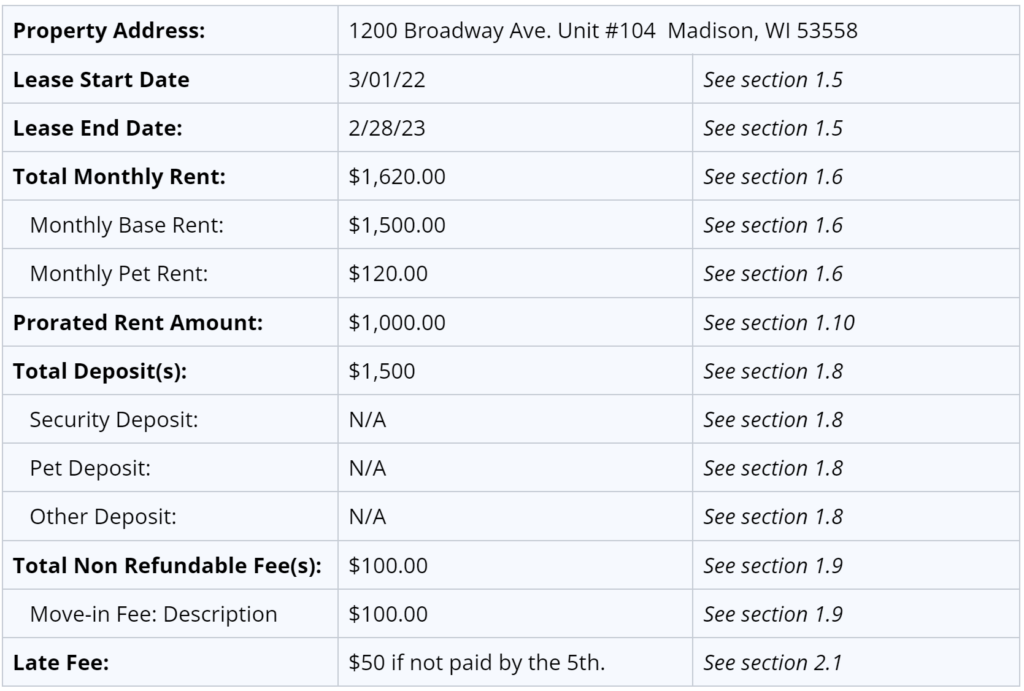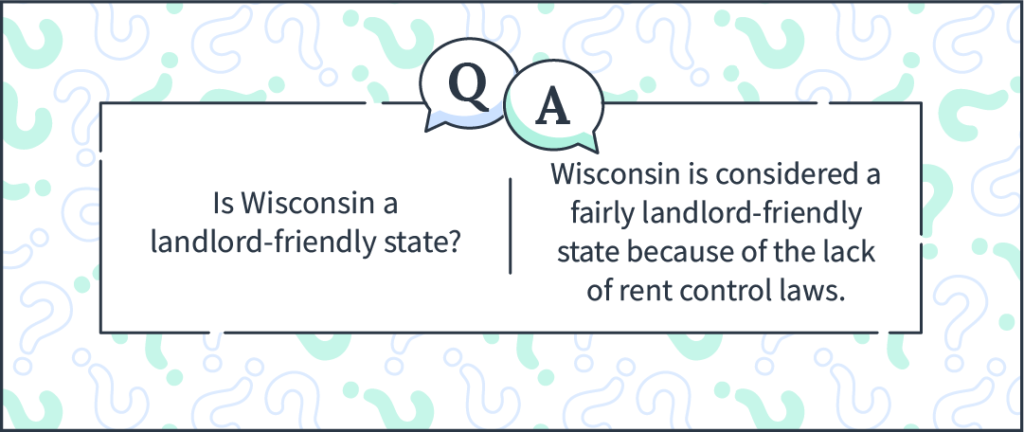Two words: cheese curds. There’s a reason Wisconsin is known as the cheese state. But that isn’t the only reason people should consider Wisconsin as a top option for relocation. With more than 15,000 lakes and rich history, this state ensures that there is always something to do. For our investors out there, Wisconsin has a very low cost of living, yet the population is on the rise, which means a consistent stream of renters for you.
Laws that impact the rental market, landlords, and tenants are constantly being decided in states. Make sure you know what’s on your ballot – find Wisconsin voting information.

Wisconsin Renters’ Rights and Landlord Responsibilities
- Must return security deposit within 21 days
- 28-day notice required before raising rent
- Must give a 12-hour notice before entering the property
- Required to make repairs in a reasonable amount of time
When it comes to Wisconsin rental laws, there are a few specifics landlords need to know:
- Security Deposit – Wisconsin law does not limit the amount a landlord may charge for the security deposit. Landlords must return the deposit within 21 days of the tenant moving out.
- Raising Rent – Landlords in Wisconsin may increase the rent to any amount with a 28-day notice.
- Notice of Entry – Wisconsin requires a 12-hour notice before entering the unit or property.
- Repairs – It is the landlord’s responsibility to keep the rental in safe and healthy living conditions. If the landlord fails to do so, the tenant may deliver a written notice of what needs to be repaired or replaced. The landlord must make the repairs within a reasonable timeframe, though the exact time is not specified by law.
- Overdue Rent – If a tenant fails to pay rent on time, the landlord must give them a notice and five days to pay. If the tenant fails to pay, the landlord may file for eviction. If the landlord doesn’t want to give the tenant a chance to pay, they can provide them with a 14-day notice to quit.
- Terminating a Lease – If a tenant needs to terminate a year-to-year lease, they must give the landlord a 28-day notice.
- Tenant Responsibilities – Tenants are required to keep the property clean and not disturb neighbors.
Application Fees
Wisconsin landlords can’t charge more than $20 for application fees.
Criminal Background Check
Landlords can check the criminal backgrounds of applicants, but those in Madison should review City Ordinance 3.23 to ensure legal compliance.
Disclosures
- Past Code Violations, such as being cited for a lack of hot/cold running water, structural hazards, inability to maintain livable temperature of 67 degrees, etc.
- Shared Utilities, including a list of the shared utilities and the formula used to break down the cost
- Domestic Abuse Protections, including the following language in either the lease or an addendum:
- NOTICE OF DOMESTIC ABUSE PROTECTIONS. As provided in section 106.50 (5m) (dm) of the Wisconsin statutes, a tenant has a defense to an eviction action if the tenant can prove that the landlord knew, or should have known, the tenant is a victim of domestic abuse, sexual assault, or stalking and that the eviction action is based on conduct related to domestic abuse, sexual assault, or stalking committed by either of the following:
- (a) A person who was not the tenant’s invited guest.
- (b) A person who was the tenant’s invited guest, but the tenant has done either of the following:
- 1. Sought an injunction barring the person from the premises.
- 2. Provided a written statement to the landlord stating that the person will no longer be an invited guest of the tenant and the tenant has not subsequently invited the person to be the tenant’s guest.
- A tenant who is a victim of domestic abuse, sexual assault, or stalking may have the right to terminate the rental agreement in certain limited situations, as provided in section 704.16 of the Wisconsin statutes. If the tenant has safety concerns, the tenant should contact a local victim service provider or law enforcement agency.
A tenant is advised that this notice is only a summary of the tenant’s rights and the specific language of the statutes governs in all instances.
Protected Classes
- Milwaukee added protections for people receiving rental assistance and gender/identity expression.
- Madison adds source of income, citizenship, military discharge, physical appearance, student status, domestic partner status, history of homelessness or unemployment, and history of domestic abuse, sexual assault, or stalking to its list of protected classes.
Security Deposits
Itemization for any lawful deductions must be mailed to the tenant’s forwarding address.
Late Fees
Wisconsin landlords can charge $20 or 20% of the monthly rent, whichever is greater, after the fifth day of rent nonpayment. However, you can charge a higher late fee if you can prove it’s “reasonable.”
Wisconsin Lease Agreement
There are three sections to a residential lease agreement. The first section outlines the custom details of the contract, such as who’s involved and for what address. Here’s an example Wisconsin lease agreement listing details found in Section 1:
Wisconsin Landlord-Tenant Law FAQ
Below are answers to some of the most commonly-asked questions when it comes to landlord-tenant laws in Wisconsin:
Can You Withhold Rent in Wisconsin?
The only case in which a tenant may withhold rent in Wisconsin is if the landlord fails to make repairs in a reasonable amount of time.
How Long Does it Take to Evict a Tenant in Wisconsin?
Evicting a tenant in Wisconsin typically takes anywhere from two to four months, depending on the reason for eviction.
Is Wisconsin a Landlord-Friendly State?
Wisconsin is considered a fairly landlord-friendly state because of the lack of rent control laws and how security deposits are handled.
What is the Eviction Process in Wisconsin?
There are four reasons a landlord may file for eviction in Wisconsin. The four reasons include failure to pay rent, violation of the lease agreement, imminent harm to others, and illegal activity. Depending on the violation, the landlord must give the tenant notice and anywhere from five to 30 days to cure their violation.
If the tenant fails to cure or move out, then the landlord may file a complaint with the court, which costs $94.50 – $114.50. After the complaint is filed, it will be served to the tenant at least five days before the hearing. The hearing will be held no longer than 25 days after the complaint was filed with the court.
If the court rules in favor of the landlord, then a writ of restitution will be issued immediately. Once the tenant has been served the writ of restitution, they will have ten days to move out.
How Much Notice Does a Landlord Have to Give a Tenant to Move Out in Wisconsin?
Landlords must give tenants a 28-day notice before requiring a month-to-month tenant to move out. For a week-to-week lease, no notice is required.
Due Diligence and Wisconsin Rental Laws
TurboTenant has utilized many municipal sources and official state statutes to compile this information to the best of our ability. However, local laws are constantly in flux, and landlords and tenants alike should do their due diligence and consult legal help when it’s needed. We hope the following list can serve as a valuable resource and allow you to succeed as a landlord or tenant in Wisconsin. Be sure to take proper precautions when it comes to finding the top candidates for your unit by utilizing our online rental application and tenant screening services.
Disclaimer: TurboTenant, Inc does not provide legal advice. This material has been prepared for informational purposes only. All users are advised to check all applicable local, state, and federal laws and consult legal counsel should questions arise.

Unlimited Everything.
Create a single Wisconsin lease agreement, or subscribe and receive unlimited lease agreements, landlord forms pack, and e-signs for a simple annual fee. Be confident with all the legal forms and tools you need as a professional landlord.
Discover Our Unlimited PlanWisconsin Landlord-Tenant Law Resources
- Landlord / Tenant Law – Wisconsin State Law Library
- Landlord / Tenant Law- Wisconsin State Legislature
- Landlord Tenant Guide
- Tenants’ Rights & Responsibilities
- RESIDENTIAL RENTAL PRACTICES – Wisconsin State Legislature
- WISCONSIN LEGISLATOR BRIEFING BOOK – HOUSING AND LANDLORD-TENANT LAW – Brian Larson, Staff Attorney Wisconsin Legislative Council
Wisconsin Fair Housing Resources
- Tenant Rights, Laws, and Protections: Wisconsin – HUD
- State of Wisconsin – Wisconsin’s Fair Housing Law & Complaint Process
- Fair Housing – HUD
Other State Resources
Wisconsin Real Estate Associations
Wisconsin City-Specific Housing Resources
Milwaukee
- City of Milwaukee – Tenants Rights and Responsibilities
- Metropolitan Milwaukee – Fair Housing Council
- University of Wisconsin Milwaukee – Tenant Rights and Responsibilities
- University of Wisconsin Milwaukee – Moving Into Your Off-Campus Home
- Greater Milwaukee Association of REALTORS®
Madison
- City of Madison – Tenant & Landlord Rights and Responsibilities
- City of Madison – Landlord Tenant Resources
- City of Madison – Rental Property Emergency Contact Registration
- REALTORS® Association of South Central Wisconsin
Green Bay
Kenosha
Appleton
- Appleton Housing Authority
- The Fair Housing Council of Northeast Wisconsin
- REALTORS® Association of Northeast Wisconsin – Appleton
Oshkosh
- City of Oshkosh – Fair Housing
- Oshkosh Housing Authority / Winnebago County Housing Authority
- REALTORS® Association of Northeast Wisconsin – Oshkosh
Eau Clair
Janesville
Fond du Lac
- Fond du Lac – Equal Opportunity/Fair Housing
- City of Fond du Lac – Landlord Resource
- REALTORS® Association of Northeast Wisconsin – Fond du Lac
Beloit
Federal Fair Housing Resources







